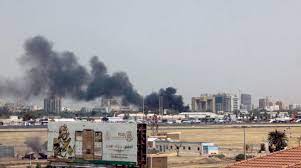
Victims of the Sudan War... between bullets and pandemics and food shortages
Maryam Abasher
The worst thing about choosing war as a means of resolving disputes is that those who ignore it ignore that its impact will affect people that have nothing to do with it. Some of them are unaware, unaware of its causes.
The war nearly approached the year, entering the eighth month, and it is still far from being resolved, as the parties diverge, the war of hatred flares and incitement to continue fighting, despite destruction, destruction, loss of innocent lives, displacement and displacement of millions.
Voices are being raised regionally and globally by peace-loving forces, and they believe that dialogue is a more appropriate means of resolving differences. The Sudanese civilian forces also see peaceful authorization as the best way to put an end to the series of violence needed by the Sudan since its independence, the broader gateway to the restoration of democratic civilian rule and the application of the glorious slogans of the December Revolution.
The widening circle of national and civilian forces demanding an end to the war, which was characterized by the countrys critical humanitarian situation, not only in conflict zones, specifically Khartoum, the capital, and the Darfur States, but also threatened all states of the Sudan as life stopped and displacement increased as the war widened.
The deterioration of humanitarian conditions is of such gravity that many civilians trapped in conflict zones have lost their lives, either because of lack of food, lack of medicine or lack of medicine, while millions of school and university students are threatened by the unknown.
Dr. Osama Mahanna, Lawyer and Legal Expert on Human Rights, In his assessment of the human rights situation in the country, he said that the least the situation described as catastrophic, Particularly in border states, such as Western Darfur at the border with Chad and South Sudan, Where cholera and hunger are rampant, adding that this situation is prevalent even in Amderman, which is in a tragic situation under the blockade, He noted that what was nominated in the news indicates that civilians are alive (Pant, Abbasiya, the supplier and the officers neighbourhood) face a blockade in all directions, that the blockade has paralysed citizens, impeded the entry of food and water, and that there is a total blackout of electricity, as well as a severe water crisis in the north of Kordofan, El Obaeid, and a total blackout of power and communications.
The news had also led to a rise in cholera infections and deaths and the spread of the pandemic in all states of the Sudan. For the first time since the beginning of the war, the news had carried panic, panic and displacement from White Nile State due to the proximity of the war to the state, both from Khartoums direction, Mount O a, and from northern Kordofan.
Muhanna said that the water outage alone meant complete lack of life, as well as that there was no way to evacuate the injured and sick, which made it more imperative to die than lifes chances. The United Nations had sounded the alarm and spoken of thousands of hungry people. and its report identified that 10 thousands of civilians had died as a result of the war, Describing the figure as very large, especially since the war has not yet completed the year, Bearing in mind the belligerents international, humanitarian and moral legal obligation to protect civilians during war and to avoid all acts that make civilians victims of war as enshrined in international humanitarian law (the law of war) and human rights law.
The humanitarian expert continued: Even the Central, North and East states are also not in the best position to sustain a high proportion of displacement that exceeds its size and potential, given the lack of flow of humanitarian assistance due to the parties lack of access to some form.
He cautioned about the deterioration of the situation of some displaced persons in the states, pointing out that some states had removed displaced persons from their schools temporarily, as well as entering winter. This means that displaced people who have been taken out of school will dominate their faces, splashing the earth and skywalking, meaning that here is a humanitarian catastrophe approaching and unparalleled in our recent history.
The humanitarian expert concluded by stressing that an ideal and now required is a ceasefire in any form, or at least a minimum obligation or obligation on the parties to combat to respect international humanitarian law (the law of war), to stop the blockade of civilians that causes starvation and thirst, and to refrain from fighting within neighbourhoods that exposes civilians to direct death.
They must be obliged to open safe corridors for the flow of humanitarian assistance, as well as to rescue the sick and injured for treatment, which was the minimum protection and the most basic rights to which combatants were bound in accordance with the law of war. They should also abide by the four Geneva Conventions and additional protocols aimed at protecting civilians in war, and extend their humanity to reducing and alleviating the suffering of combatants themselves.

